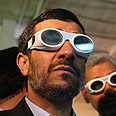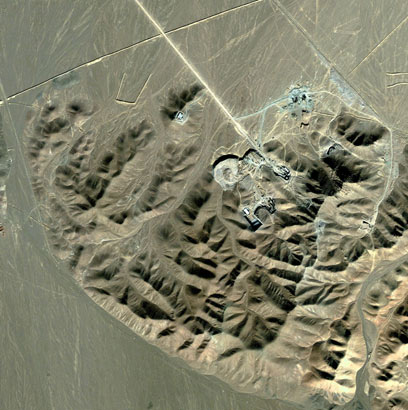
Report: Iran expands nuclear capacity underground
Western diplomats say Islamic Republic installed 'hundreds' of enrichment centrifuges in Fordo facility; UN nuclear agency forming a special Iran team. MK Danon: Israel 'preparing for all scenarios'
Iran has installed many more uranium enrichment machines in an underground bunker, diplomatic sources said on Thursday, potentially paving the way for a significant expansion of work the West fears is ultimately aimed at making nuclear bombs.
Several sources said Iran had put in place additional enrichment centrifuges in its Fordo facility, buried deep inside a mountain to protect it against any enemy strikes. One source suggested it involved hundreds of machines.
Related stories:
- Iranian general: Israel must be destroyed
- Iran: Israel won't launch 'stupid' attack
- Iran: If war breaks out, we'll annihilate IDF
"Our basic understanding is that they were continuing to install," a Vienna-based diplomat said, adding the new centrifuges were not yet operating.
If confirmed in a report expected next week from the UN atomic watchdog, the development is likely to be seen as a sign of Iran's continued defiance of international demands to curb its nuclear programme, which Tehran says is entirely peaceful.
At Fordo, near the holy Shiite Muslim city of Qom, Iran is enriching uranium to a fissile concentration of 20%, activity which the West wants it to stop immediately as it brings it closer to the level required for nuclear weapons.
Iran denies Western allegations that it is seeking a nuclear weapons capability, saying it needs to refine uranium to that level to provide fuel for a medical research reactor.
But its refusal to suspend enrichment - which can have both civilian and military uses - has been met with increasingly tough Western sanctions and heightened speculation that Israel may attack its nuclear sites.
Meanwhile, the UN nuclear agency is forming a special Iran team, drawing together sleuths in weapons technology, intelligence analysis, radiation and other fields of expertise as it seeks to add muscle to a probe of suspicions that Tehran worked secretly on atomic arms, diplomats told The Associated Press.
Creating a unit focused on only one country is an unusual move for the International Atomic Energy Agency, reflecting the priority the UN nuclear watchdog is attaching to Iran amid fears that it is moving closer to the ability to make nuclear weapons. It also indicates frustration by top agency officials over Iran's refusal to cooperate with IAEA experts who are trying to follow up on suspicions that Tehran was - or is - secretly working on an arms program.
Iran says such allegations are based on evidence fabricated by the United States and Israel and insists its nuclear program is meant only for making reactor fuel, medical isotopes and peaceful research. But it refuses to give up uranium enrichment, which can produce both reactor fuel and the core of nuclear warheads, despite offers of fuel from abroad. And its stonewalling of the IAEA probe has increased concerns that it has something to hide.
The agency's move comes at a crucial time. With both the agency and international diplomatic efforts stalemated in attempts to engage the Islamic Republic on its nuclear program, fears are growing that tensions could spill over into armed conflict.
Israeli leaders have been loudly expressing impatience over Western diplomatic and economic moves to deter Iran and increasingly talk of attacking its nuclear facilities, though some analysts believe the saber-rattling is a bluff to increase pressure on Tehran. Iranian leaders have rejected Israel's warnings, threatening punishing retaliation.
The four diplomats, who demanded anonymity because they were not authorized to discuss the restructuring plans, spoke ahead of a renewed attempt Friday by the agency to breach Iranian resistance to its requests for access to sites, documents and people linked to the suspected secret weapons-related work.
One of diplomats likened the restructuring plan to the agency's Iraq "Action Team" - the squad of experts who uncovered components of Saddam Hussein's fledgling nuclear-weapons program in the 1990s.
That unit, however, had broad on-the-ground access under U.N-mandated inspections. That's lacking in the case of Iran, which allows agency inspectors access only to its known nuclear activities and has for years blocked its attempts to probe alleged evidence of secret nuclear weapons research and development.
Asked for reaction on the IAEA plans, Ali Asghar Soltanieh, Iran's envoy to the IAEA, said: "I have not heard of such a thing, and I cannot comment." IAEA spokeswoman Gill Tudor said the agency had no immediate comment.
Danny Danon, deputy speaker of the Israeli Knesset and a member of Prime Minister Benjamin Netanyahu's Likud party, told the AP in a phone interview Thursday that Israel was "preparing for all scenarios." He also was dismissive of the agency's new Iran squad.
"We are getting close to the point where the window of opportunity will be closed to us, and that's why you hear all those voices," he said when asked about the war rhetoric. "We have seen too many teams, too many summits, too much talk. It is about time to take action."
• Follow Ynetnews on Facebook and Twitter
• Receive Ynetnews updates directly to your desktop











